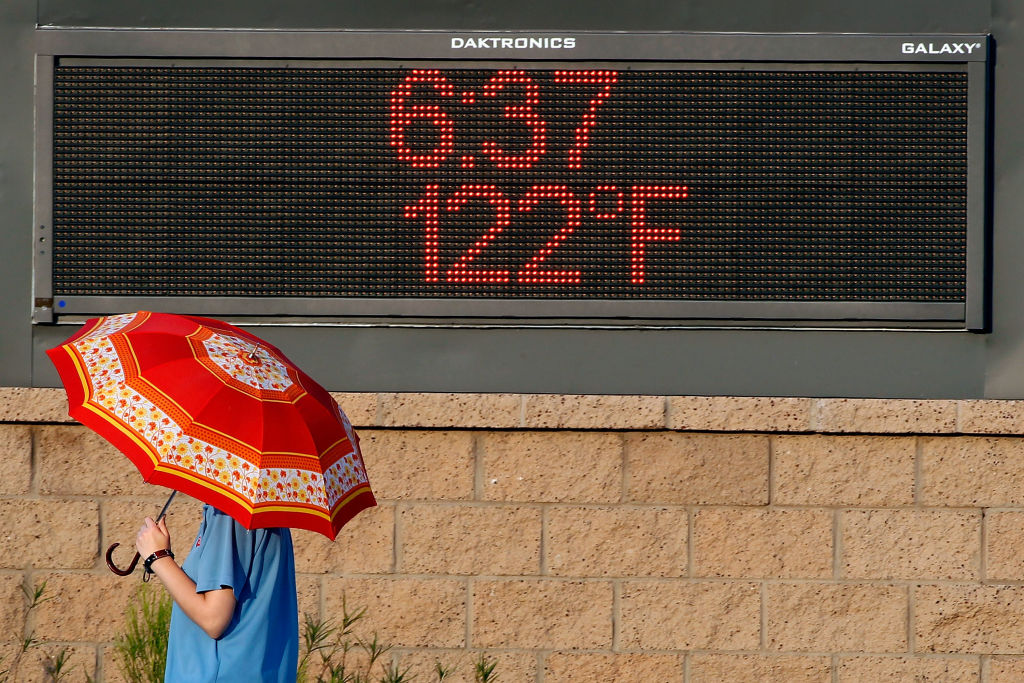When the ocean is 97 degrees
The world is reaching a climate tipping point


A free daily email with the biggest news stories of the day – and the best features from TheWeek.com
You are now subscribed
Your newsletter sign-up was successful
It hit 97 degrees this week in the ocean off South Florida. Not the air temperature — the ocean itself. In steam-bath Miami, the heat index has surpassed 100 degrees for more than 30 straight days. Large swaths of Texas, Nevada and Arizona have been broiling in 110-plus degrees for a week (Phoenix: 118 degrees), with no end to the inferno in sight. In Canada's Northwest Territories — just a few miles south of the Arctic Circle — temperatures climbed to 99.3 degrees. In China, officials are opening underground air-raid shelters so people can hide from life-endangering heat. Climate change's effects are becoming surreal: Last week was the hottest week ever recorded in terms of the average global temperature. July 4 was the hottest day ever recorded — warmer, say scientists, than any other day over the last 125,000 years. With the El Niño climate pattern releasing even more heat in coming months, said climatologist Christopher Hewitt of the World Meteorological Organization, "we are in uncharted territory."
So what do we do? Like the proverbial frog that does not jump out of the slowly heated pot, people really do get used to almost anything, no matter how unpleasant. Just 8% of Americans identify climate change as the most important issue facing the country, a recent poll found. Yet extreme weather events like floods and wildfires that cause more than $1 billion in damage are becoming commonplace, occurring every 18 days now — compared with every 82 days in 1980. The world is finally moving toward solar, wind and renewable energy, but at too slow a pace. This summer's extremes already are exceeding the most pessimistic climate scenarios. As we continue to burn fossil fuels, climatologists warn, the heat will grow even more punishing in coming years, and disasters more frequent. My fellow frogs, have you noticed that the water in this pot is getting awfully warm?
This is the editor's letter in the current issue of The Week magazine.
The Week
Escape your echo chamber. Get the facts behind the news, plus analysis from multiple perspectives.

Sign up for The Week's Free Newsletters
From our morning news briefing to a weekly Good News Newsletter, get the best of The Week delivered directly to your inbox.
From our morning news briefing to a weekly Good News Newsletter, get the best of The Week delivered directly to your inbox.
A free daily email with the biggest news stories of the day – and the best features from TheWeek.com
William Falk is editor-in-chief of The Week, and has held that role since the magazine's first issue in 2001. He has previously been a reporter, columnist, and editor at the Gannett Westchester Newspapers and at Newsday, where he was part of two reporting teams that won Pulitzer Prizes.
-
 Moltbook: The AI-only social network
Moltbook: The AI-only social networkFeature Bots interact on Moltbook like humans use Reddit
-
 Judge orders Washington slavery exhibit restored
Judge orders Washington slavery exhibit restoredSpeed Read The Trump administration took down displays about slavery at the President’s House Site in Philadelphia
-
 Kurt Olsen: Trump’s ‘Stop the Steal’ lawyer playing a major White House role
Kurt Olsen: Trump’s ‘Stop the Steal’ lawyer playing a major White House roleIn the Spotlight Olsen reportedly has access to significant U.S. intelligence
-
 The plan to wall off the ‘Doomsday’ glacier
The plan to wall off the ‘Doomsday’ glacierUnder the Radar Massive barrier could ‘slow the rate of ice loss’ from Thwaites Glacier, whose total collapse would have devastating consequences
-
 Can the UK take any more rain?
Can the UK take any more rain?Today’s Big Question An Atlantic jet stream is ‘stuck’ over British skies, leading to ‘biblical’ downpours and more than 40 consecutive days of rain in some areas
-
 As temperatures rise, US incomes fall
As temperatures rise, US incomes fallUnder the radar Elevated temperatures are capable of affecting the entire economy
-
 The world is entering an ‘era of water bankruptcy’
The world is entering an ‘era of water bankruptcy’The explainer Water might soon be more valuable than gold
-
 Climate change could lead to a reptile ‘sexpocalypse’
Climate change could lead to a reptile ‘sexpocalypse’Under the radar The gender gap has hit the animal kingdom
-
 The former largest iceberg is turning blue. It’s a bad sign.
The former largest iceberg is turning blue. It’s a bad sign.Under the radar It is quickly melting away
-
 How drones detected a deadly threat to Arctic whales
How drones detected a deadly threat to Arctic whalesUnder the radar Monitoring the sea in the air
-
 ‘Jumping genes’: how polar bears are rewiring their DNA to survive the warming Arctic
‘Jumping genes’: how polar bears are rewiring their DNA to survive the warming ArcticUnder the radar The species is adapting to warmer temperatures
